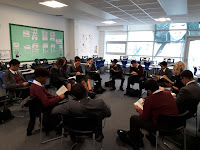Prep - Morning Reading in KS3
 |
| A Morning Reading group in a music room! |
Without a doubt, this is mine - and many of our staff's - favourite part of the day. It provides a calm, peaceful start (8.30-9.00) where students are either getting lost in a novel (is there a better way to start the day?) or revising key concepts for GCSE. This blog describes the Morning Reading programme.
Morning Reading
As we know, there is no one size fits all approach to developing reading skills. Many schools have adopted DEAR or tutor time reading to provide dedicated reading time for students. In my opinion, what makes Morning Reading special is that reading happens every morning, in every classroom and spare space, with every teacher in the school.
Furthermore, groups are tailored to reading ages. Upon entry to KAA, all students complete a NGRT reading test and all students in KS3 are grouped with those of a similar reading age in their year group. Group sizes range from around 6- 20 students and some students use this time to work on the Fresh Start programme or read in smaller groups of 1-3. Teachers and their groups, with the help of the librarian, can also select from a range of possible titles, providing teachers and students with ownership of the reading and allowing them to chose texts that appeal to the group. Groups can read the classics, yet this is also an exciting opportunity to read to modern children's novels and there are currently over 70 different choices. Teachers of all subjects often speak passionately about the books they are reading with their group and are often keen to discuss and recommend them to other groups. On average, groups read around 4-5 novels per year.
‘Every teacher is a reading teacher’
At KAA, this is one of our mantras. All of our teachers are trained how to teach reading and this 30 minutes of every day is precious time that we have to make the most of. The overall aim of these sessions is to create students who are confident and enthusiastic readers, as well as improving their reading ages. Teachers are regularly trained on the best approaches to teaching reading (another blog to be written here!). We have given whole school training on the EEF literacy report and its recommendations for reading and, after reading Alex Quigley's excellent 'Mind the Reading Gap' this Easter, I have lots of other ideas around questioning prior to, during and after reading to share with staff. The librarian (our hero!) also posts weekly tips in the bulletin after seeing examples of best practice throughout the week.
Examples below:
My next post will cover the KS4 lectures - particularity focusing on the 'Lit Lectures' and the thinking behind our approaches to literature at GCSE.
James





Comments
Post a Comment